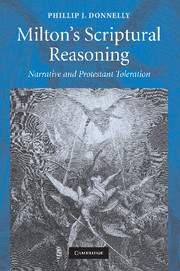Book contents
- Frontmatter
- Contents
- Preface and acknowledgments
- Abbreviations and editions
- 1 Introduction: Scriptural reasoning
- PART I SCRIPTURAL REASONING IN MILTON'S PROSE
- 2 Reason, rhetoric, and educational reading
- 3 Monism and Protestant toleration
- PART II BIBLICIST RHETORIC AND ONTOLOGY IN PARADISE LOST
- PART III BIBLICIST POETICS AND HERMENEUTIC ETHICS
- Notes
- Subject index
- Index of Scripture references
2 - Reason, rhetoric, and educational reading
Published online by Cambridge University Press: 04 September 2009
- Frontmatter
- Contents
- Preface and acknowledgments
- Abbreviations and editions
- 1 Introduction: Scriptural reasoning
- PART I SCRIPTURAL REASONING IN MILTON'S PROSE
- 2 Reason, rhetoric, and educational reading
- 3 Monism and Protestant toleration
- PART II BIBLICIST RHETORIC AND ONTOLOGY IN PARADISE LOST
- PART III BIBLICIST POETICS AND HERMENEUTIC ETHICS
- Notes
- Subject index
- Index of Scripture references
Summary
If Milton does not share in the modern assumption that reason is reducible to coercion, or the sheer necessity of calculation, where, beyond The Tenure of Kings and Magistrates, do we find evidence that he held an alternate view? This chapter and the next focus on a selection of Milton's prose, showing how those writings embody his view that “reason” (human and divine) is the poetic gift of peaceful difference. The argument in this chapter considers the educational connections between what is probably Milton's most frequently read English prose work, Areopagitica (1644), and one of his least read Latin prose works, Artis Logicae Plenior Institutio (1672). Both of these texts, through their respective treatments of “reason,” engage the pedagogical means and ends described in Of Education (1644, repub. 1673). At the same time, Areopagitica presents an early example of Milton's rhetorical appeal to the biblical metanarrative which, in Of Education, he refers to as “the story of Scripture” (CPWii:387). This story arises from and reveals the interaction between divine and human reason; however, as we noted in Chapter 1, this story is specifically not a modern metanarrative in that it does not pretend to offer predictive mastery over fortune; the story begins with the goodness (not neutrality) of creation, and therefore it does not participate in those problematics arising from the modern fact–value distinction.
- Type
- Chapter
- Information
- Milton's Scriptural ReasoningNarrative and Protestant Toleration, pp. 27 - 48Publisher: Cambridge University PressPrint publication year: 2009

